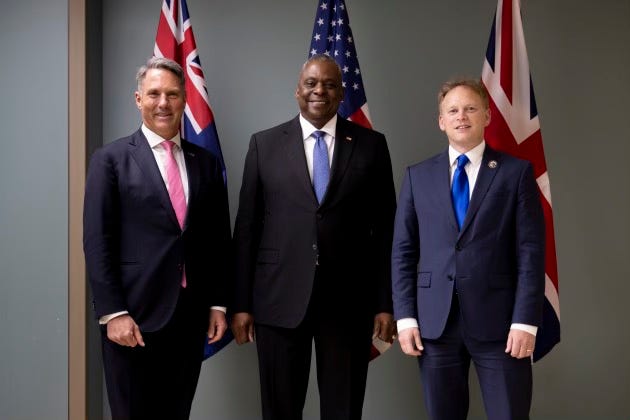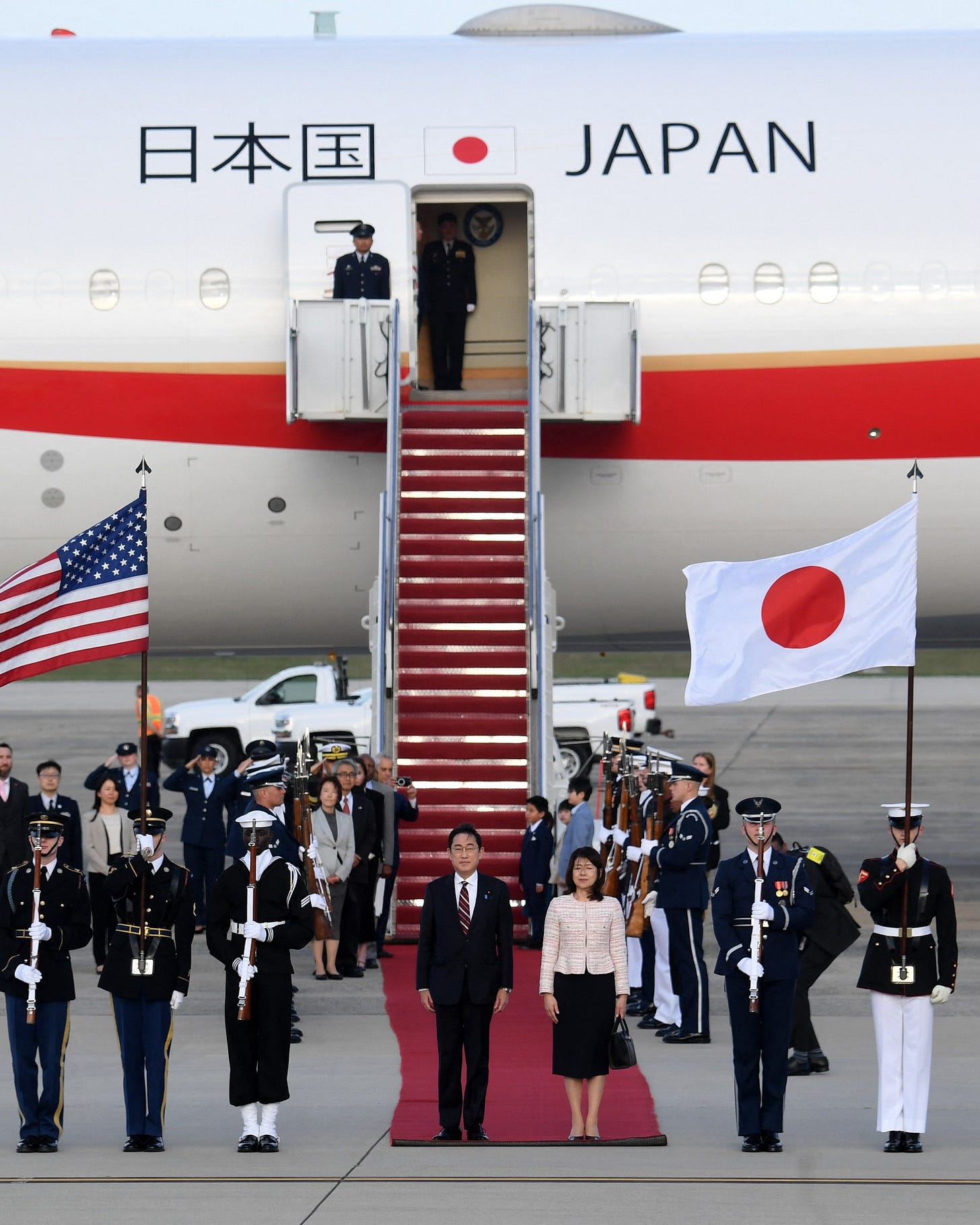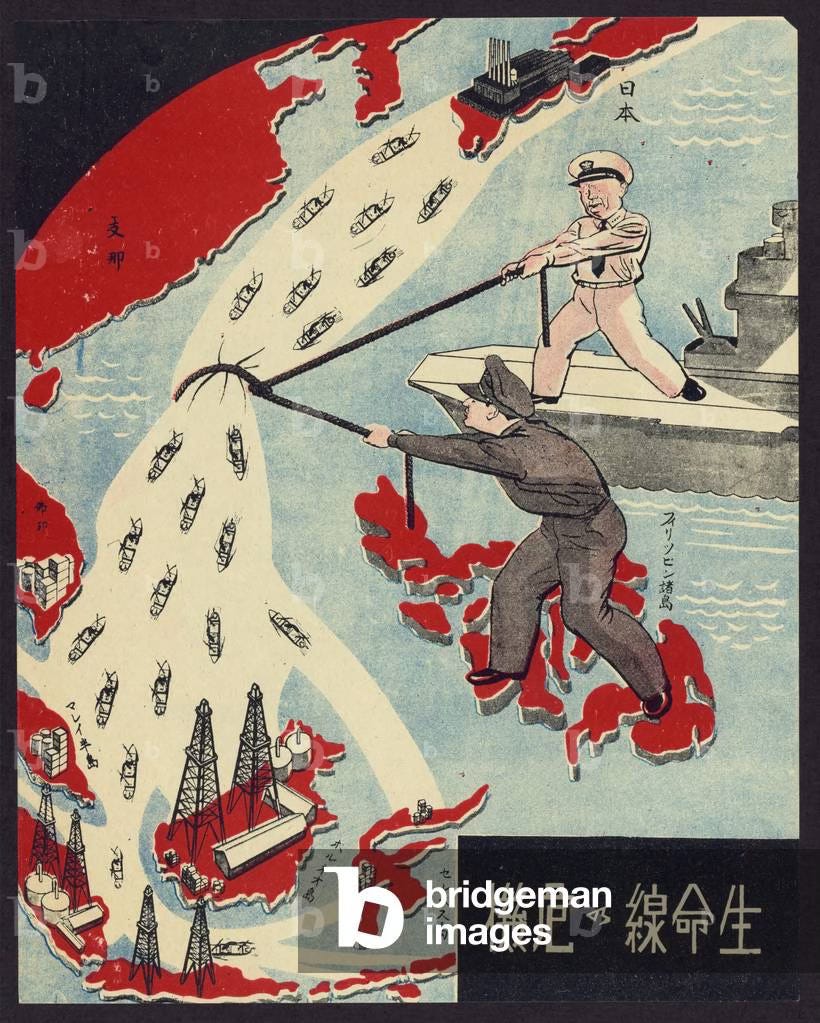BLOC AID
China urges AUKUS to stop forming exclusionary blocs, Japan cleared to join AUKUS alliance, Is Japan AUKUS cooperation limited?
Chinese embassy urges U.S., UK and Australia to stop forming exclusionary blocs
CGTN Beijing
The Chinese Embassy in the United Kingdom on Tuesday voiced firm opposition to the insistence of the U.S., the UK and Australia on advancing the so-called trilateral security partnership in disregard of the wide concerns of regional countries and the international community about nuclear proliferation risks.
An embassy spokesperson made the remarks on Tuesday, in response to a question concerning a joint statement by the defense ministers of the three countries claiming that they are considering cooperation with Japan on AUKUS Pillar II advanced capability projects.
The spokesperson said such moves will inevitably escalate the risk of nuclear proliferation, exacerbate arms race in the Asia-Pacific, and undermine regional peace and stability. "China is gravely concerned and firmly opposed to this."
Defense chiefs of the U.S., the UK and Australia announced their plan to include Japan in their controversial trilateral security alliance on Monday.
The first pillar of AUKUS aims to help Australia acquire nuclear-powered submarines, as well as deepen cooperation on a range of other advanced defense technologies. The second pillar, peddled by U.S. officials recently, has a clear strategic intention to involve more countries in the security pact, with a focus on delivering advanced capabilities and sharing technologies across a range of areas including quantum computing, artificial intelligence and cyber technologies.
"We urge the U.S., the UK and Australia to abandon the Cold War mentality, stop cobbling together exclusionary blocs, and cease stirring trouble and camp confrontation in the Asia-Pacific region," the diplomat said. "Japan must learn lessons from history and be prudent about its words and actions when it comes to military security."
Read more here.
Japan cleared to join AUKUS alliance
Japan is set to officially join AUKUS, the first nation to sign on outside the original Australia-United Kingdom-United States trilateral security partnership.
By Max Blenkin, Canberra
AUKUS was announced in September 2021 primarily to create a pathway for Australia to acquire nuclear-powered but conventionally-armed submarines, which at this stage aren’t of interest to Japan.
However, AUKUS’ second strand termed Pillar II – cooperation on development of advanced technology – is, and Japan’s engagement seems to be a done deal.
Japan’s accession was foreshadowed by America's Ambassador in Tokyo Rahm Emanuel who wrote in the Wall Street Journal on Friday that Japan was about to become the first additional Pillar II partner in AUKUS.
Japan's Prime Minister Fumio Kishida is visiting the US this week, with the prospect that Japan’s official inclusion will be announced following his meeting with US President Joe Biden on Wednesday.
UK Secretary of State for Defence Grant Shapps said consultation with other countries, including Japan, as potential collaborators on some advanced military capabilities under Pillar II would begin this year.
“Australia, the UK and US are considering Japan’s potential involvement in some elements of the Pillar II program,” he said in a statement released in the UK overnight.
“Pillar II includes quantum technologies, undersea capabilities, artificial intelligence (AI) and autonomy, cyber, hypersonic and counter-hypersonic capabilities and electronic warfare capabilities, supported by innovation and information sharing.”
Shapps said partners have always been clear on the intent to engage additional nations in Pillar II as the work progresses.
A statement released on Tuesday by Defence Minister Richard Marles, US Defense Secretary Lloyd Austin and UK Secretary of State for Defence Grant Shapps, delivered a report card on AUKUS progress a year after the announcement of the Optimal Pathway for Australia to acquire nuclear submarines.
That included the reference to Japan.
“Recognising Japan's strengths and its close bilateral defence partnerships with all three countries, we are considering cooperation with Japan on AUKUS Pillar II advanced capability projects,” they said.
The statement included a repeat of the AUKUS rationale, without mentioning China.
“Our three countries seek to maximise the strategic benefits of the AUKUS partnership to support security and stability in the Indo-Pacific region and beyond,” they said.
“Australia's acquisition of a conventionally armed, nuclear-powered submarine capability is a necessary response to the rapidly evolving strategic environment.
“Strengthening our trilateral defence capabilities and our industrial capacity will enable AUKUS partners to deter coercion or aggression in the region more effectively.”
The statement noted that significant tangible steps had occurred, most recently announcements that Australia had selected ASC and BAE Systems to build SSN-AUKUS submarines and selection of ASC as Australia's nuclear-powered submarine sustainment partner.

The most significant maintenance activity to be conducted on a visiting US SSN in Australia is scheduled for the second half of this year.
“The maintenance activity, supported by a Submarine Tender, will be critical to building Australia's ability to safely and securely sustain US SSNs in preparation for the establishment of Submarine Rotational Force – West,” it says.
“In anticipation of this forthcoming activity, 37 Royal Australian Navy sailors reported to the USS Emory S. Land in Guam in late January 2024 to begin training and to gain the necessary skills and qualifications.”
Later this year, ASC employees will begin placements at Pearl Harbor Naval Shipyard to develop skills necessary to sustain Virginia-class SSNs
These will be the first Australian civilian industry personnel to train in the US following passage of the US National Defense Authorization Act for Fiscal Year 2024.
More than 20 Australian sailors and officers are currently in the US Navy Submarine Training system.
The first three RAN submarine officers completed the US naval nuclear power training pipeline and are on track to graduate from the Submarine Officer Basic Course in Groton, Connecticut, later this month.
In June they will begin postings to US Virginia-class submarines operating from of Pearl Harbour. Over the next year numbers in the US submarine training system and aboard US submarines will exceed 100.
Read more here.
Is Japan AUKUS cooperation limited?
By John Blaxland, Canberra
With Japanese Prime Minister Fumio Kishida visiting Washington this week, rumours have circulated that Japan might soon join the AUKUS security pact between Australia, the United States and the United Kingdom.
Australian Prime Minister Anthony Albanese has downplayed the suggestion, indicating this is not something that will happen soon. He added any cooperation would, for now, be on a project-by-project basis.
What role could Japan possibly play in the alliance? And what are the potential complications?
Partner on the ‘Pillar II’ level
Japan has grown increasingly uncomfortable at China’s assertiveness in the Indo-Pacific region, including its “wolf warrior” diplomacy, frequent cyber attacks and harassment of other countries’ ships and aircraft. China also has an ongoing dispute with Japan over islands in the East China Sea.
It’s not surprising, then, that Japan has doubled down on its alliance with the US and security ties with other like-minded nations. It was an early supporter of AUKUS, viewing the alliance as a positive step for regional security that would counterbalance China’s heavy-handed influence.
For some time now, Japan was talked about as a potential fourth partner in the agreement. While the US, UK and Australia have all said they are interested in working with Japan, however, a formal invitation to become a so-called “Pillar I” partner is not likely anytime soon.
The Pillar I level of the partnership involves the US transferring nuclear submarine propulsion technology to Australia. In the meantime, the US will operate a rotational submarine force in Western Australia, until Australia is supplied with refurbished, second-hand US Navy Virgina Class submarines, expected in the mid-2030s.
However, as Rahm Emanuel, the US ambassador to Japan, wrote last week, Japan is about to become the alliance’s first “Pillar II” partner. This level focuses on the sharing of technology related to artificial intelligence, autonomous systems, hypersonic missiles and precision guided munitions.
Japan has advanced technological capabilities that are very much in demand in AUKUS – not just in the Pillar II space, but also within Pillar I.
This includes nuclear research and technology, which could prove useful as the AUKUS partners look to accelerate the quantity, scale and speed of production of nuclear-propulsion submarines. Japan’s expertise does not necessarily extend to weapons-grade nuclear technology, but its civil nuclear energy capability places it at the forefront of potential candidates for engagement on this front.
Japan, however, has its own robust diesel-electric and air-independent propulsion submarine production lines, which does not make participation in AUKUS Pillar I that important for the country. With a much shorter coastline to traverse, its submarines can remain submerged and undetected for the majority of their potential missions – unlike Australia with its long transits between coastal ports.
Nonetheless, Japan has strong capabilities and critical skills in the areas covered by the Pillar II level of cooperation. And Japan has a keen interest in making sure those skills and capabilities are honed and world class. This makes participation in Pillar II key to its national interests.
Complications to AUKUS expansion
There is a complicating factor, though. AUKUS is still a very new partnership. As such, it is struggling to translate good will and its high level of political support in all three countries into practical benefits. This includes ensuring the drafting and implementation of procedural mechanisms to allow technology transfers to take place between the members.
That is difficult enough to organise between three countries that speak the same language and are culturally very close. Japan, while increasingly seen as a trusted member of western partnerships, remains a country that is culturally very distinct and comes with a deeply ingrained historical reticence toward militarisation.
In addition, Japan has acquired a reputation as being relatively vulnerable to cyber attacks and espionage. More than 70 years of leaning on the US as its defence guarantor has generated what has been perceived as a relatively lax approach toward security, secrecy and maintaining trusted and watertight networks, although recent legislation could address these shortfalls.
While the AUKUS countries have had their own fair share of domestic security challenges and leaks, they see themselves as having learned from past mistakes in a way that Japan has not yet mastered.
My latest book Revealing Secrets (co-authored with Clare Birgin) also points to the trusted inter-generational top secret collaboration that binds Australia with the US and UK as part of the Five Eyes arrangements (along with New Zealand and Canada).
This has not been replicated with any other international partners to quite the same level, extent or duration. This intimate, familial collaboration is not widely understood by outsiders, but cannot be easily replicated and is handled with delicacy by these countries. No one inside AUKUS wants to mess with the dynamics that have enabled such close and trusted ties.
In addition, there is a reluctance to go beyond three core members of AUKUS until the envisioned technology sharing is proven to work. It remains a fragile endeavour, in part because all three members are rambunctious democracies that are going to have multiple elections in the lifetime of the project.
And the next couple of elections – if not, most importantly, the next one in the US in November – is going to consolidate the direction of the alliance.
A delicate balancing act
Yet, there is a real appetite for encouraging Japan to participate as a trusted collaborator with the US and Australia. This is demonstrated in the trilateral arrangements between them, as well as the quadrilateral ties with India (known as the Quad). Japan is also boosting its ties with the Philippines, South Korea and the United Kingdom.
So, it is a delicate balancing act to encourage Japanese engagement in external security arrangements, while being mindful the country still has a constitution that binds it to a strictly defensive and relatively benign military posture. (It is, however, more willing now to acquire offensive military capabilities.)
No doubt, such initiatives will be frowned upon by China. But this isn’t happening in a vacuum. Indeed, the AUKUS alliance would not be politically possible were it not for the dramatic upsurge in Chinese defence spending and its relentless cyber attacks and “grey zone” operations in the region.
On balance, it appears Japan’s inclusion in a number of discreet components of AUKUS looks like the next natural step in response to these rising challenges.
Read more here.









